The Electronic Intifada 2 September 2021
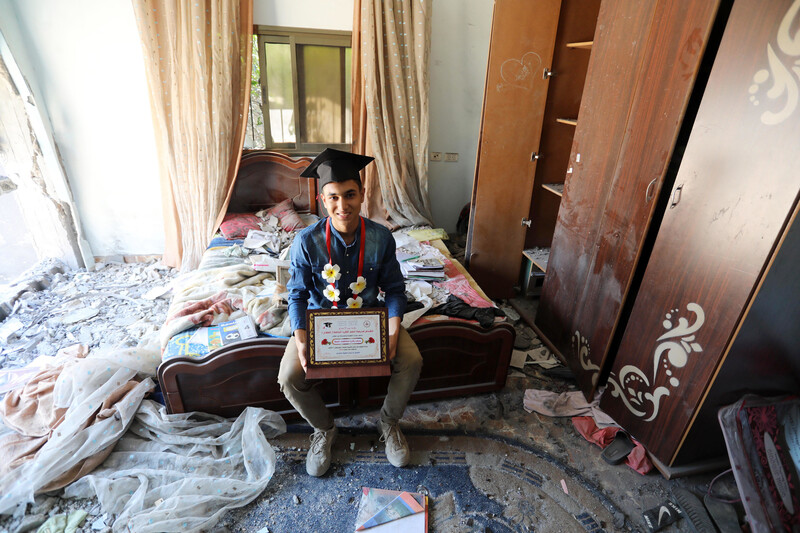
Yahya al-Sakka, who scored 94.9 percent on his high school matriculation exams, celebrates in the rubble of his room which was damaged by Israeli airstrikes during May, Khan Younis, southern Gaza Strip, 5 August.
APA imagesIsraeli occupation forces shot and killed several Palestinians in the West Bank and Gaza Strip during August.
Imad Ali Muhammad Dweikat, 38, was shot in the chest and killed by Israeli forces during protests in Beita, a village near the northern West Bank city of Nablus, on 6 August.
Israeli soldiers have killed multiple residents of Beita this year as villagers protest the building of an Israeli colonial settlement on a hill belonging to nearby Palestinian communities.
Six other Palestinians were killed by Israeli forces during arrest raids in the northern West Bank in August.
Dia al-Din al-Sabarini, 25, was shot in the stomach during an arrest raid in Jenin on 3 August and died from his wounds a week later.
Israel claimed that its raiding forces “came under attack from gunfire, explosives, firebombs and rocks before soldiers returned fire at the attackers,” the AP news agency reported, though no soldiers were injured during the lethal raid.
Undercover Israeli forces killed four Palestinians in the city of Jenin in the early hours of 16 August.
The Palestinian health ministry said that the four men – Saleh Ammar, 19, Raed Abu Saif, 21, Nour al-Din AbduIlah Jarrar, 19 and Amjad Iyad Husseiniya, 20 – were shot with live ammunition in the upper chest.
Israel is holding the remains of Jarrar and Husseiniya.
Israel claimed that its raiding forces came under fire but the mayor of Jenin asserted that the men were killed without justification. The Palestinian Authority said that Israel’s “cold-blooded” killings were “premeditated.”
The killings came days after Israeli army chief Aviv Kochavi requested that military forces “reduce” shootings in the West Bank, where more than 50 Palestinians had been killed by live ammunition since the beginning of the year.
Al-Haq, a Palestinian human rights group, called on the International Criminal Court to expedite its investigation of war crimes in the West Bank and Gaza Strip following the deadly Jenin raid.
Child killed in raid
Imad Hashash, 15, was also killed during an Israeli military raid on 24 August. He was on the roof of his home in Balata refugee camp, in Nablus, when he was shot in the head by soldiers.
The teen was the 12th Palestinian child shot and killed by Israeli forces in the West Bank this year, according to Defense for Children International Palestine.
UNRWA, the UN agency for Palestine refugees, said it was “deeply saddened” by the killing of Hashash, who was a ninth-grade student at one of its schools.
Two Palestinians in Gaza were fatally wounded by Israeli military fire as protests resumed along the boundary with Israel.
Osama Khaled Dueij, 31, was shot during protests east of Gaza City on 21 August and died from his injuries four days later.
Omar Hasan Mousa Abu al-Nil, 13, was shot and injured during the same protests and succumbed to his wounds on 28 August.
An Israeli soldier was critically wounded by Palestinian fire from Gaza during the same demonstrations and died from his injuries on 30 August.
A Palestinian citizen of Israel was meanwhile killed by Israeli forces in the West Bank in the late hours between 31 August and 1 September.
Raed Jadallah, 39, was shot for no apparent reason by soldiers conducting a stakeout at a checkpoint near Beit Ur al-Tahta in the central West Bank.
Teen killed in demolition
In eastern Jerusalem, 17-year-old Ali Burqan was killed when a cement wall collapsed on him while he was helping his neighbors destroy their home in the Beit Hanina neighborhood on 28 August.
The destroyed home belonged to the Abdeen family who built it in 2010 and received an Israeli demolition order at the beginning of August, according to Ir Amim, an Israeli nonprofit group.
Palestinian families in eastern Jerusalem are forced to build on their own land without permits as they are rarely granted by Israel. This denial of permits is part of Israel’s effort to create a coercive environment to force Palestinians to leave their home city.
Palestinians facing demolition orders raze their own homes to avoid steep fines imposed by Israel.
Also during August, Palestinians in Gaza launched incendiary balloons towards Israel in protest against the ongoing severe blockade on the territory imposed since 2007. Israel responded with airstrikes on Gaza.
Palestinians in Gaza launched two rockets towards Israel on 16 August for the first time since May.
“One of the rockets was intercepted by the Israeli Iron Dome defense system and the other fell short inside Gaza,” the UN monitoring group OCHA said. “No injuries or damage to property was reported.”
Protests also resumed along Gaza’s eastern boundary with Israel, with occupation soldiers using live fire, rubber-coated bullets and tear gas against demonstrators.
Two protesters and an Israeli soldier were fatally injured during the initial mass protest on 21 August, after which Israel carried out a series of airstrikes in Gaza, causing no injuries.
Refugees vulnerable in Syria, Lebanon
Meanwhile in Syria, UNRWA said that “heavy shelling and clashes” in Deraa in the south of the country “have caused loss of life, injury and the displacement of many hundreds of vulnerable families, including Palestine refugees.”
UNRWA said it was “extremely concerned for the lives and wellbeing of some 30,000 Palestine refugees registered with the agency in south Syria.”
A third of those refugees lived in Deraa camp before the outbreak of protests and conflict in the country 10 years ago. The camp was subjected to “large-scale destruction as a result of the hostilities,” according to UNRWA.
Some 3,000 refugees returned to the camp this year and more than half were displaced by recent clashes, UNRWA said on 15 August. Medicines and food stocks were depleted and water and electricity shut off in the camp, the agency added.
The ongoing hostilities have meanwhile impacted Palestinian refugees’ movement and limited access to UNRWA services such as cash and food assistance and health services.
UNRWA also warned in August that Palestinian refugees were bearing the brunt of multiple crises in Lebanon.
“The unprecedented depreciation of the local currency has slashed the purchasing power of Palestine refugees as prices continue to increase dramatically, with inflation surpassing 100 percent,” the agency said.
“Surveys conducted lately by UNRWA confirm that employment opportunities, including as daily paid workers, of Palestine refugees in Lebanon have become almost inexistent and that almost all Palestine refugees are living below the poverty line.”
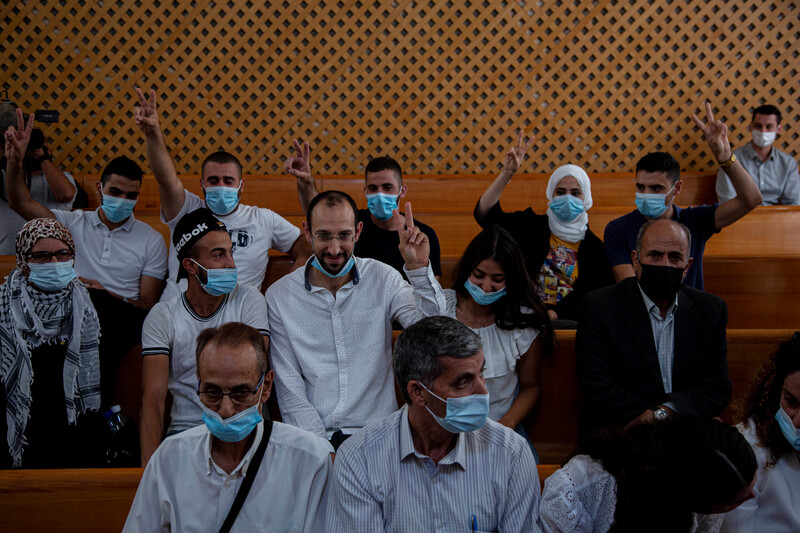
Residents of Sheikh Jarrah, a Palestinian neighborhood in the eastern sector of Jerusalem, attend a hearing at the Israeli high court after four families from the neighborhood appealed legal efforts to expel them from their homes to make way for Israeli settlers, 2 August.
ActiveStills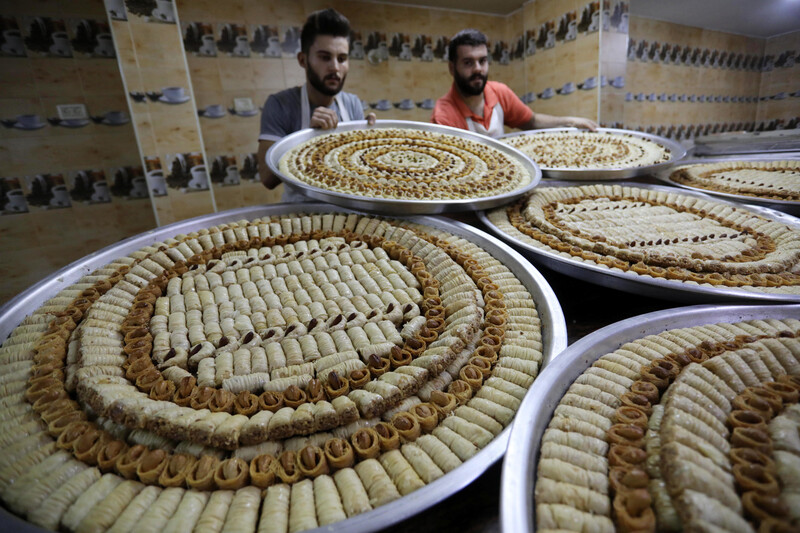
Palestinian vendors prepare sweets a day before the publication of the tawjihi or high school matriculation exam results at a factory in Gaza City on 2 August. Buying and distributing sweets of all kinds is a tradition among Palestinians during tawjihi results.
APA images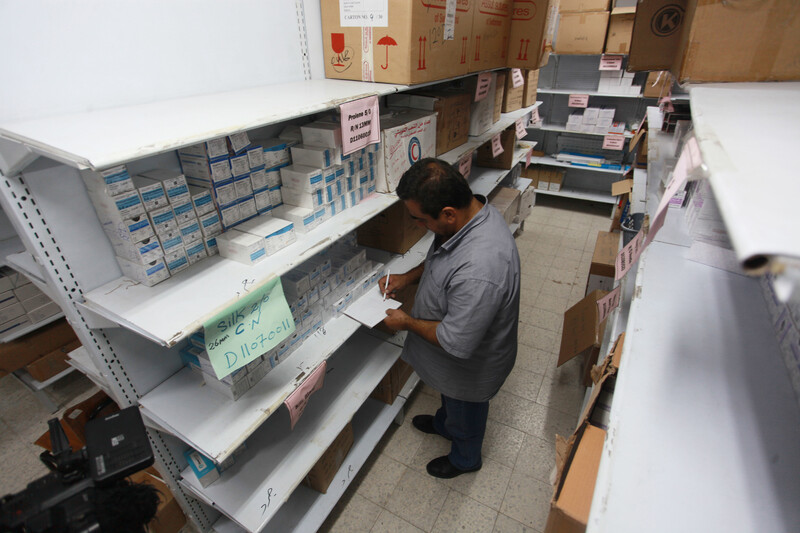
A health ministry employee inventories medicines at low or zero stock due to Israel’s continued blockade, inside ministry warehouses in Gaza City, 2 August.
APA images
Palestinian protesters confront Israeli occupation forces in Beita village near the West Bank city of Nablus on 2 August.
APA images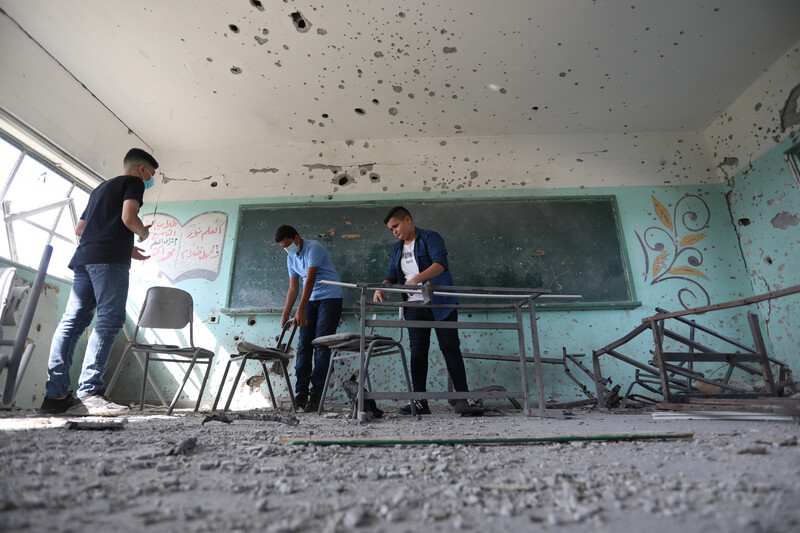
On the first day of the schoolyear, Palestinian students inspect a classroom at a Gaza City school destroyed in Israeli airstrikes during May, 16 August.
APA images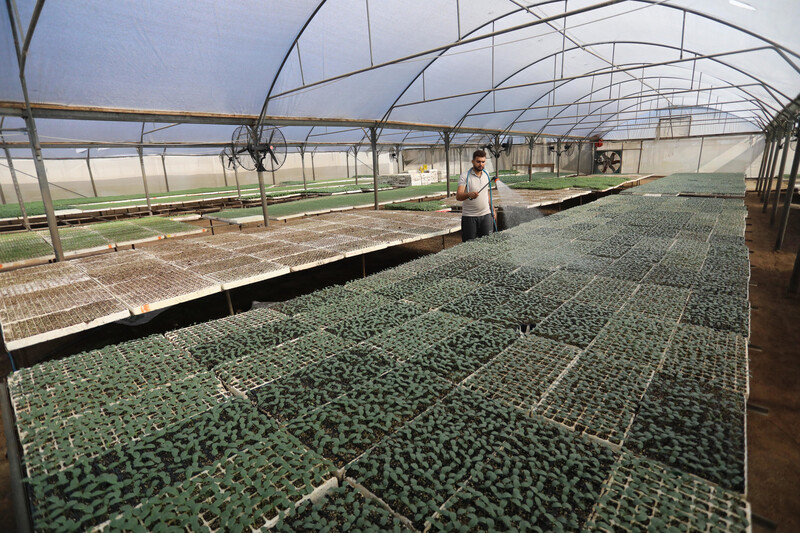
A Palestinian farmer waters tomato seedlings started using mechanized cultivation in a nursery in Rafah, southern Gaza Strip, on 17 August.
APA images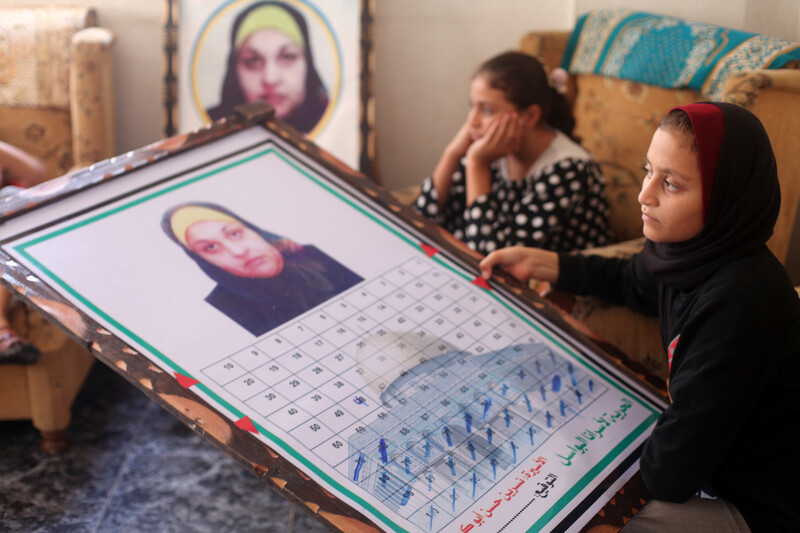
The family of Palestinian prisoner Nisreen Hassan Abu Kmail sit inside their Gaza City home on 18 August. Abu Kmail, who has been detained by Israel since late 2015, is due to be released in October.
APA images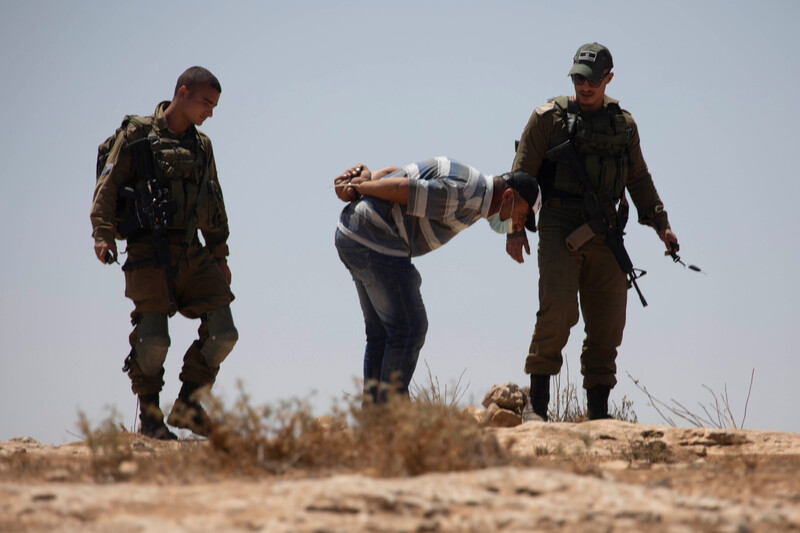
A detained Palestinian stands handcuffed next to Israeli soldiers during a demonstration against new structures built in Avigail settlement near al-Tuwani in the South Hebron Hills on 20 August. Police and army forces dispersed the protest with stun grenades and tear gas, arresting two protesters — one Palestinian and an Israeli left-wing activist.
ActiveStills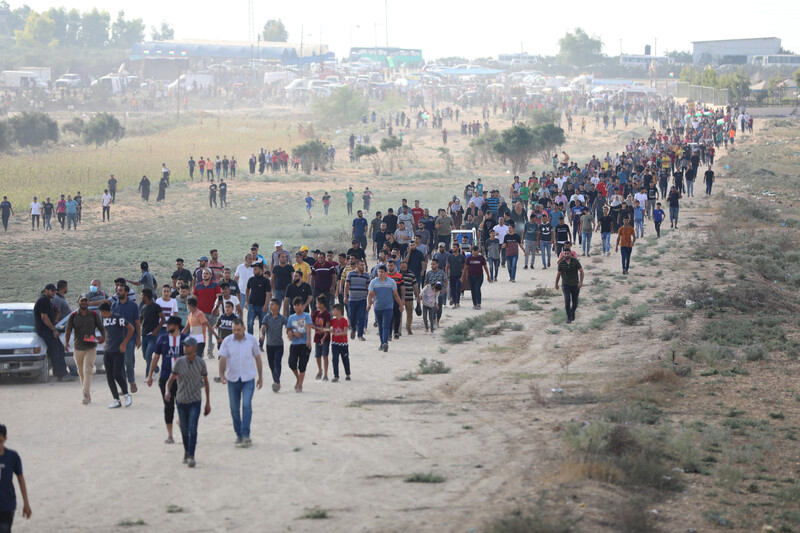
Palestinians march towards the Gaza-Israel boundary to protest the Israeli siege and to mark the 52nd anniversary of the attempt to burn Jerusalem’s al-Aqsa mosque, one of the holiest sites in Islam, 21 August.
APA images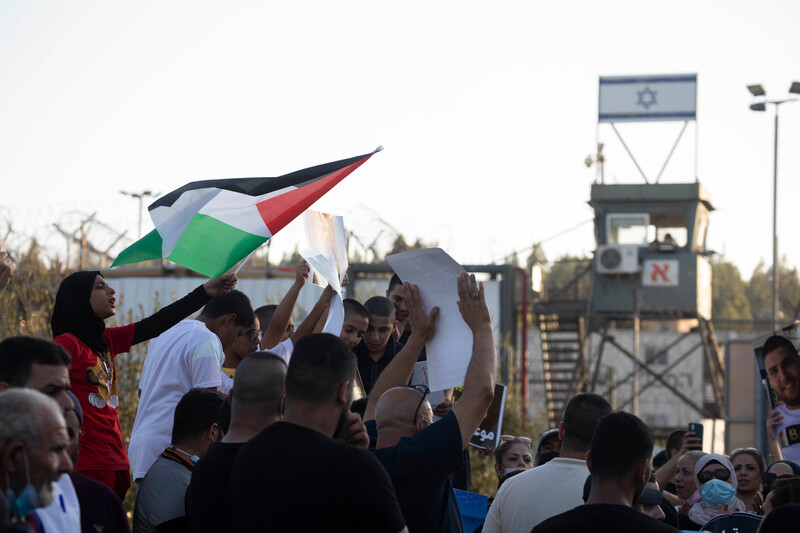
Palestinians protest outside Israel’s Megiddo prison in solidarity with Palestinians who were arrested during May in Lydd and other cities, 22 August. According to family members, the brother of Moussa Hassouna, who was shot by Israeli settlers in May, and four other prisoners, were attacked and injured by prison officers the previous week in Megiddo prison.
ActiveStills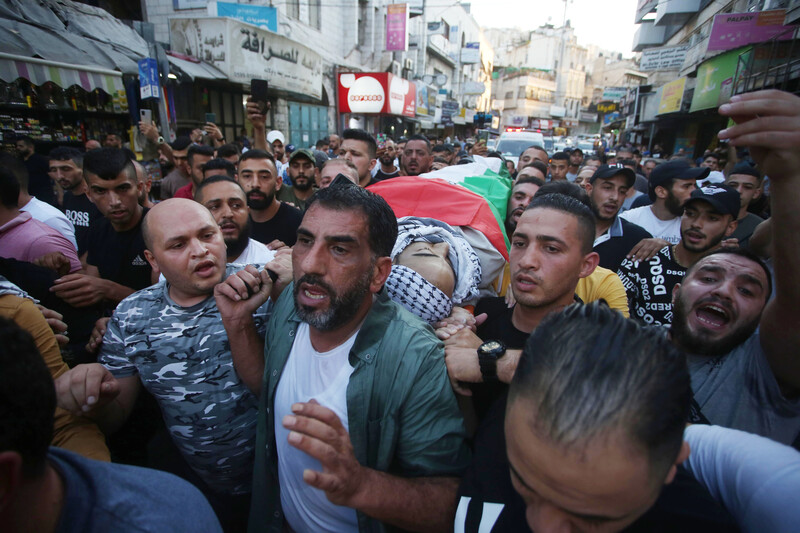
Palestinian mourners carry the body of Dia al-Sabarini, 25, who died from his wounds after being shot by Israeli forces the previous week in the West Bank city of Nablus, 11 August.
APA images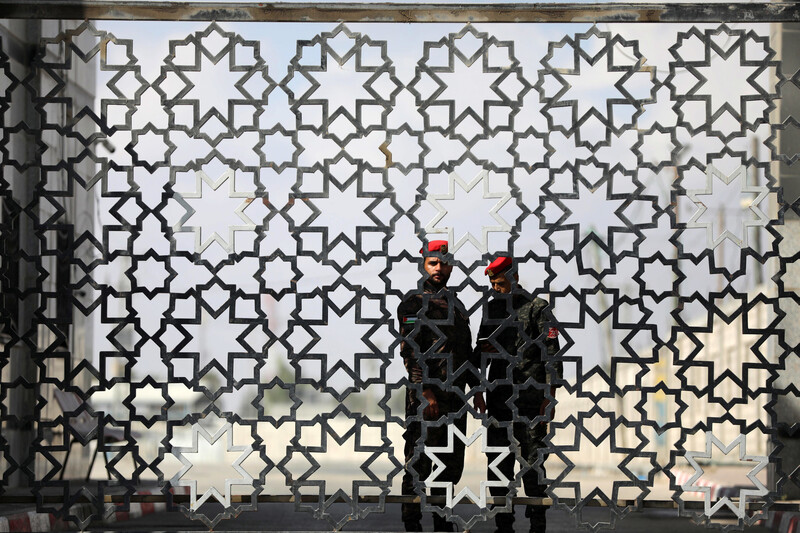
Palestinian security forces stand guard at the closed Rafah crossing with Egypt in the southern Gaza Strip on 23 August. Egypt has told Gaza authorities it would close the Rafah crossing beginning 23 August.
APA images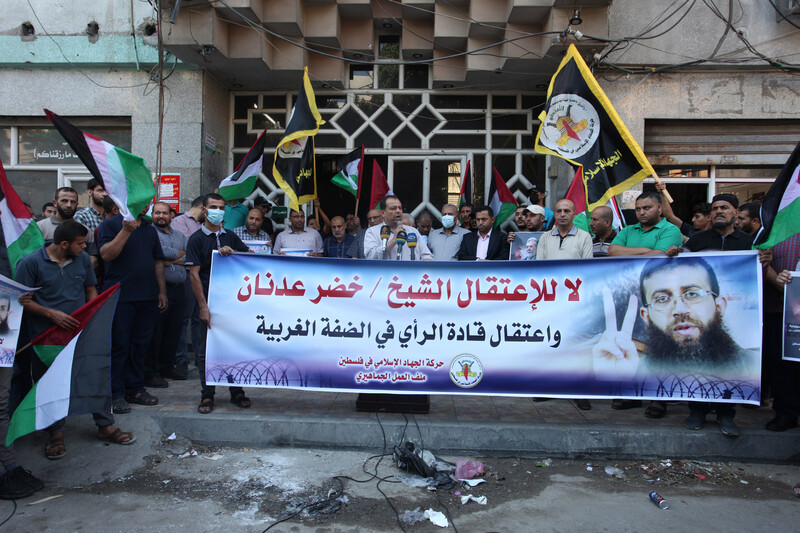
Palestinian supporters of the Islamic Jihad movement in Gaza City protest against the Palestinian Authority’s arrest of Khader Adnan, 23 August. PA police say they arrested 24 people who protested Ramallah’s response to the death of a prominent political activist while in the custody of PA security forces in June.
APA images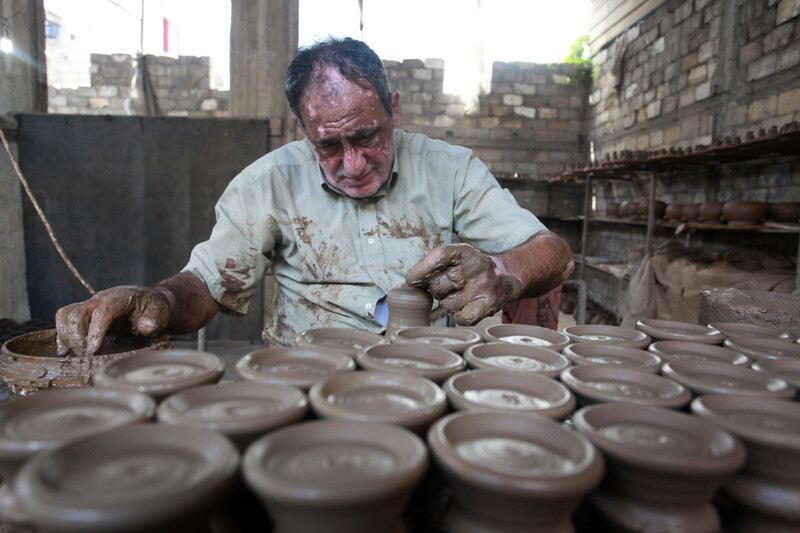
A Palestinian pottery worker makes earthenware vases at a Gaza City workshop on 23 August.
APA images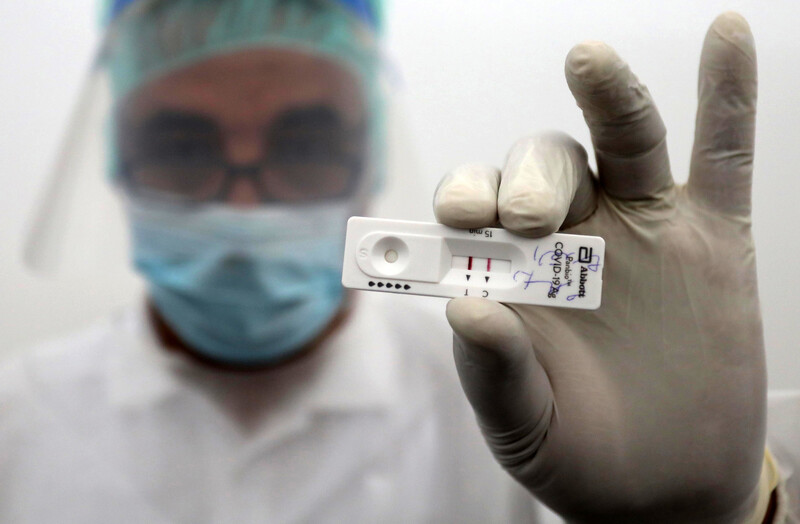
A Palestinian health worker collects a swab sample for a COVID-19 test at a temporary vaccination center set up in Khan Younis, southern Gaza Strip, 23 August. Palestinian health officials announced that day that the first cases of the Delta variant were confirmed in the besieged Gaza Strip, home to more than two million Palestinians.
APA images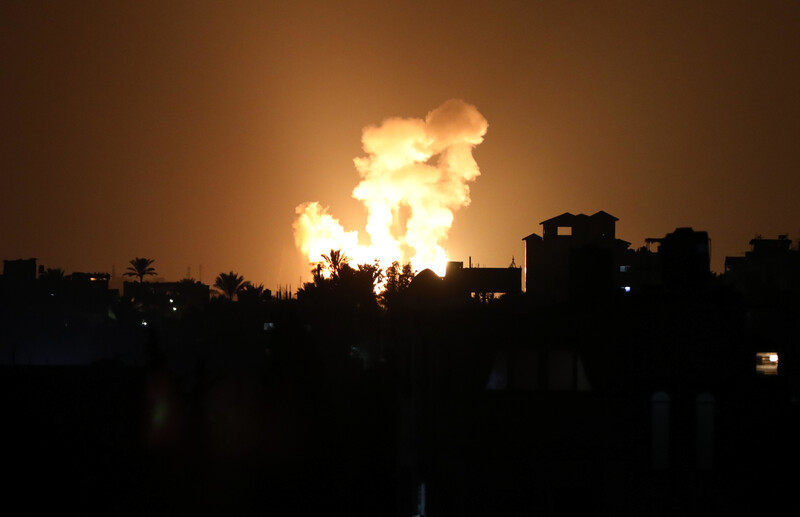
A fireball rises in the sky following an Israeli airstrike in Khan Younis, southern Gaza Strip, on 23 August. Israel launched airstrikes after incendiary balloons launched from the Strip started fires in the country’s south.
APA images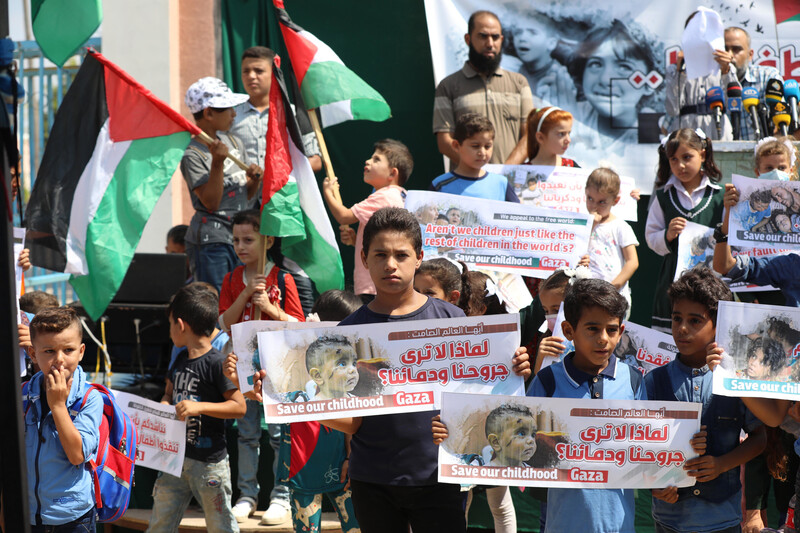
Palestinian children protest against the Israeli blockade on Gaza in front Erez checkpoint in Beit Hanoun, northern Gaza Strip, on 24 August. The blockade in its current severe form has been in place since June 2007, though Israel has restricted freedom of movement in and out of the territory for much longer.
APA images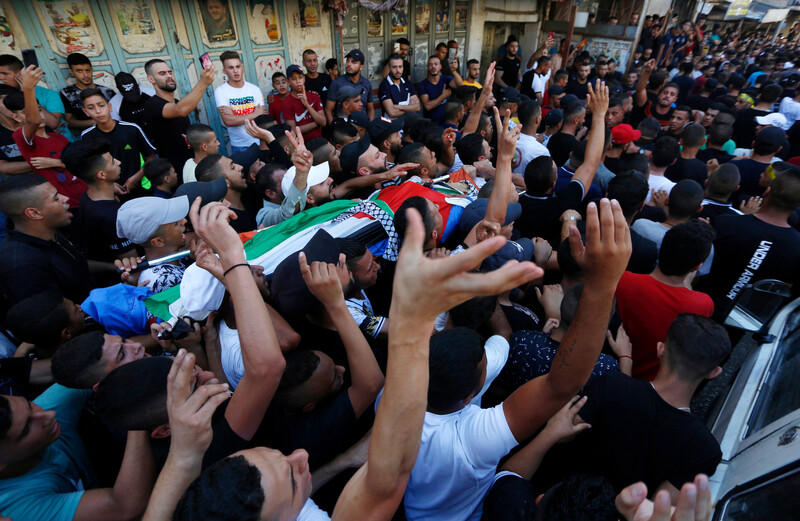
Palestinians attend the funeral for Imad Khaled Saleh Hashash, 15, at Balata refugee camp in the West Bank city of Nablus, on 24 August. The Palestinian teen was shot in the head by Israeli soldiers when he was standing on his rooftop watching an arrest raid in the camp.
APA images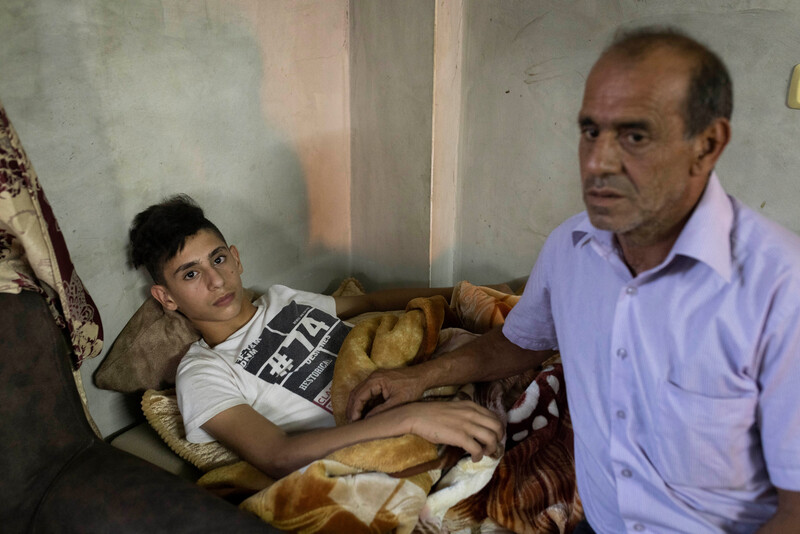
Tareq Zubeida, 15, at his home in the northern West Bank town of Silat al-Dahr one week after being kidnapped and brutally attacked by Israeli settlers, 25 August. Settlers hit Zubeida with their car and tied him to the vehicle before dragging him to an isolated area and beating him. The attack lasted for about half an hour, during which Zubeida says the settlers tied him to a tree, beat him with a belt, sprayed him with pepper spray, electrocuted him, and then burned him with the car’s cigarette lighter.
ActiveStills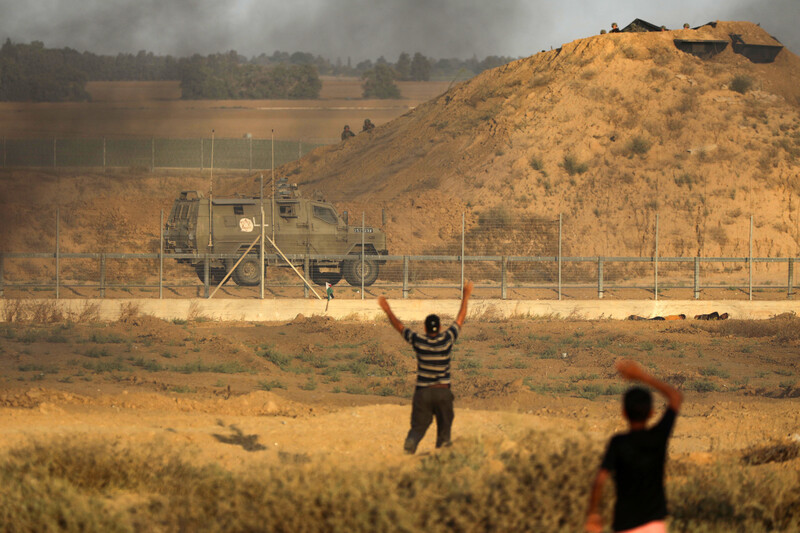
Palestinian demonstrators gather during a protest along the boundary fence east of Khan Younis, southern Gaza Strip, on 25 August. Palestinian groups in Gaza pledged to continue protesting along the boundary to pressure Israel to remove its blockade and to allow for the reconstruction of Gaza following the 11-day Israeli assault on the coastal enclave during May
APA images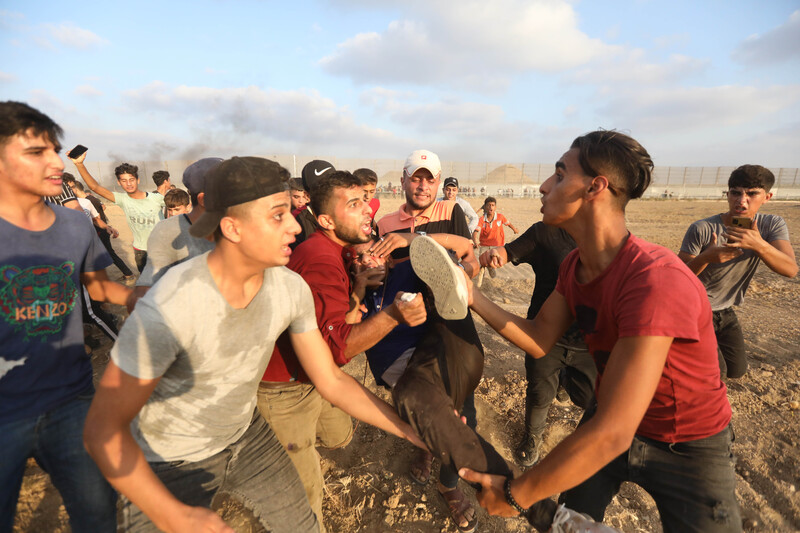
Palestinians evacuate a protester injured by Israeli fire during a demonstration near the Israeli-built barrier that surrounds the besieged Gaza Strip, 21 August.
APA images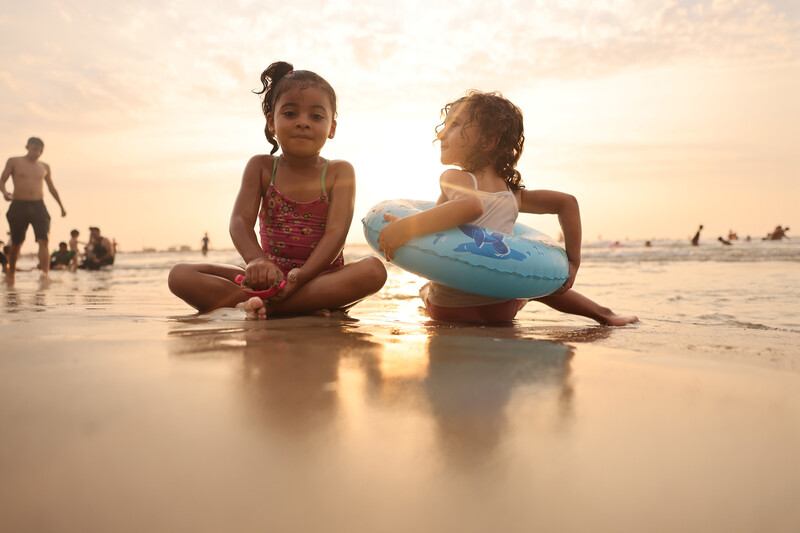
Palestinians gather at the Gaza City beach on 28 August. The beach is one of the few open public spaces in the densely populated city.
APA images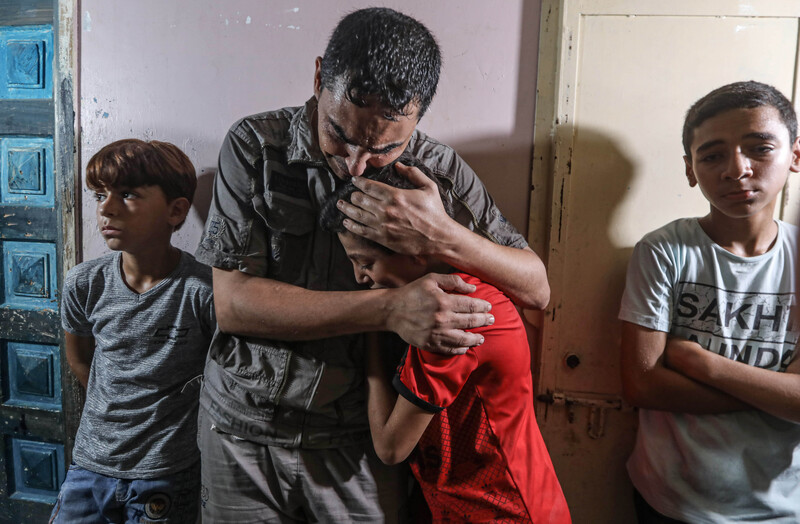
Palestinians mourn during the 28 August funeral for Omar Abu al-Nil, 13, who was shot in the neck by Israeli soldiers during a protest east of Gaza City the previous week.
ActiveStills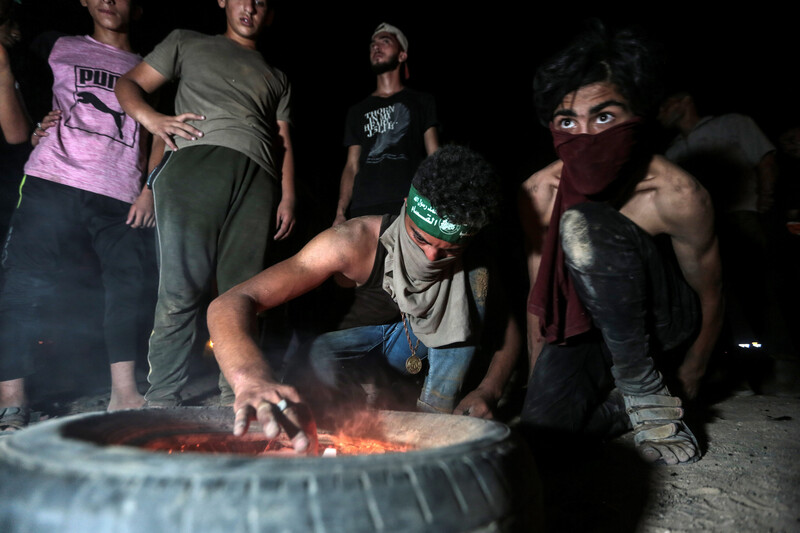
Palestinian protesters calling themselves the “night confusion units” burn tires near the Gaza-Israel boundary east of Gaza City on 28 August.
APA images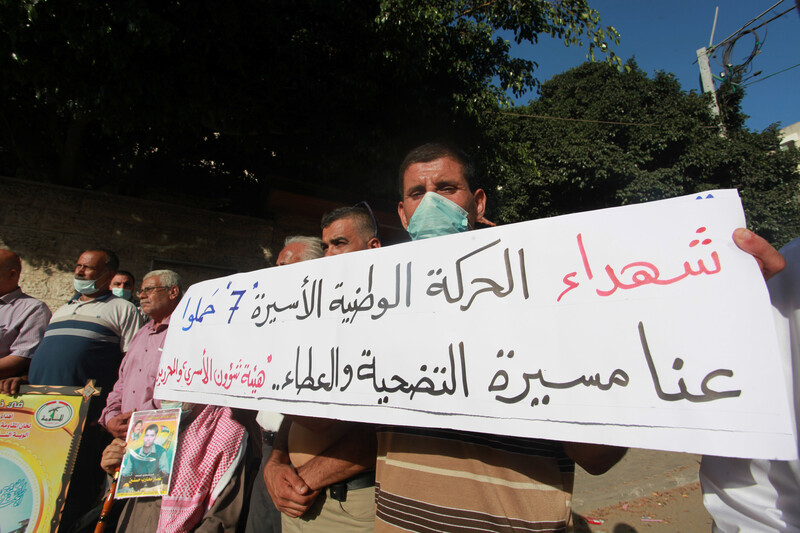
Palestinians rally to demand that Israel return the bodies of Palestinians killed by its forces and in Israeli detention in front of the offices of the International Committee of the Red Cross in Gaza City, 29 August.
APA images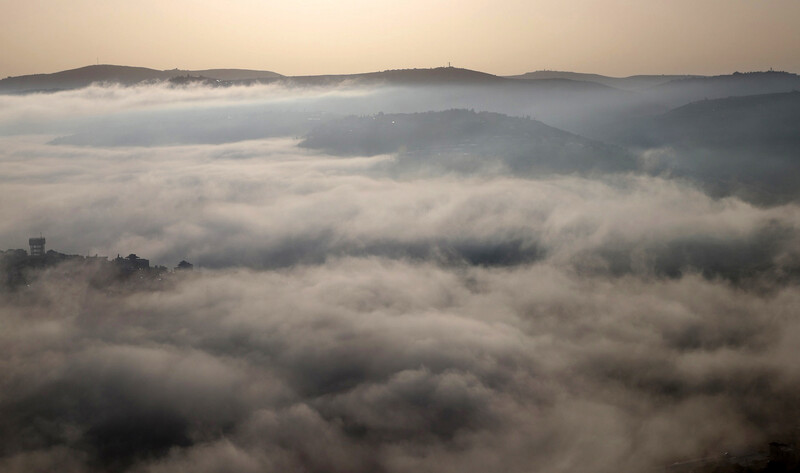
Morning fog covers the landscape in al-Lubban al-Sharqiya, a town near the West Bank city of Nablus, on 30 August.
APA images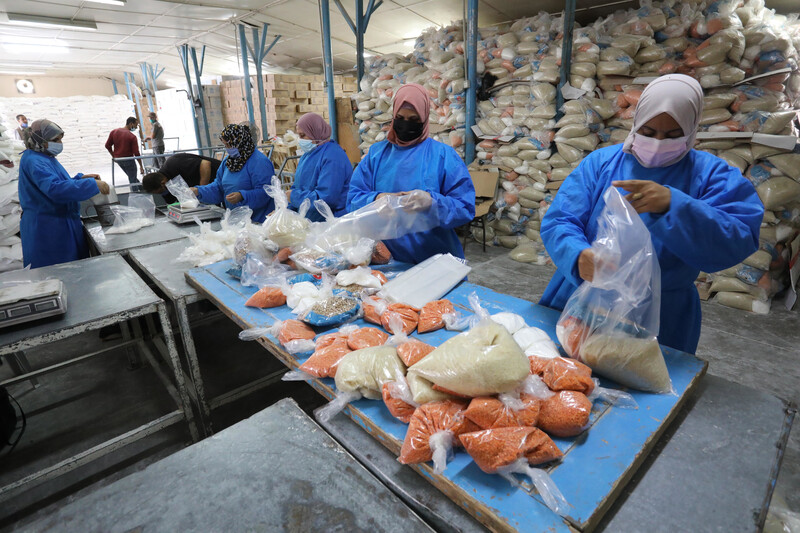
Palestinian employees at UNRWA, the UN agency for Palestine refugees, prepare food for refugees in Deir al-Balah, central Gaza Strip, on 30 August. Palestinian refugees in Gaza and elsewhere have slammed UN cuts to aid and services provided to them. The agency has faced chronic budget shortages amid increasing need for its services.
APA images
A medical worker administers a dose of the COVID-19 vaccine during a vaccination drive at a school in the West Bank city Hebron on 30 August.
APA images

